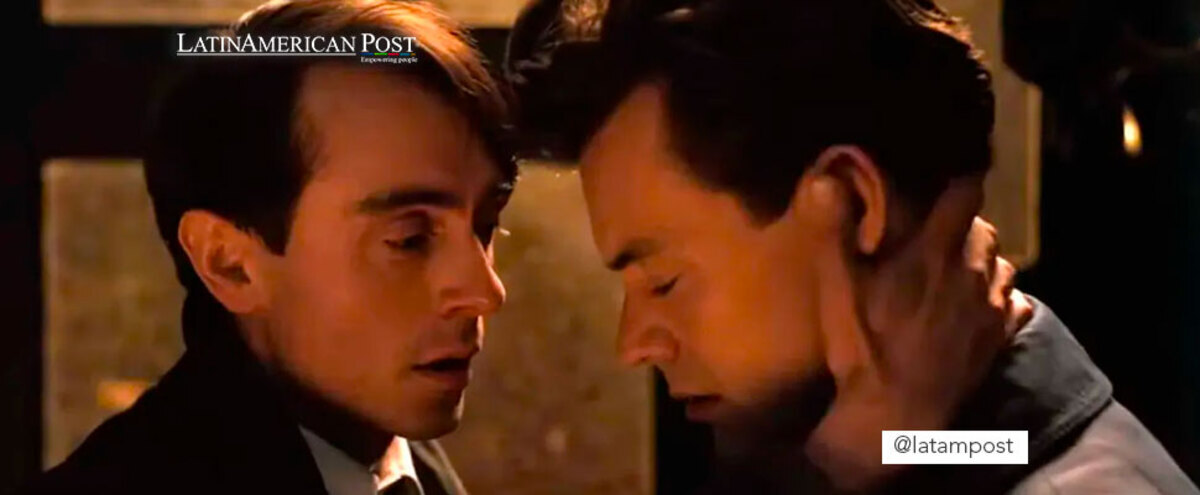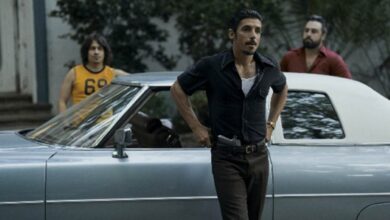“My Policeman”: Harry Styles and the Portrait of Being Gay in 1950s England
Harry Styles returns to the cinema as the protagonist in "My Policeman", a story that tries to represent what it meant to be gay in England in the middle of the last century .

Photo: YT-Prime Video
LatinAmerican Post | Julián Gómez
Listen to this article
Leer en español: “My Policeman”: Harry Styles y el retrato de ser gay en la Inglaterra de los 50
After several accusations of queerbait for allegedly profiting from the LGBTI community from aesthetics without recognizing himself as a member of it, Harry Styles returns to the cinema playing a homosexual character. He does so in "My Policeman", a film that recently premiered on Prime Video and is based on the book of the same name by Bethan Roberts.
“My Policeman”, directed by Michael Grandage, tells the story of Tom (Harry Styles and Linus Roache), Marion (Emma Corrin and Gina McKee) and Patrick (David Dawson and Rupert Everett): a policeman with a certain innocence, a caring and naive teacher, and an art curator with a modern mood. The three of them get involved in a love triangle, in which the only unrequited one ends up being Marion. All this is framed in an English society of the late 50s, where homosexuality is prohibited.
The story takes place in Brighton & Hove, a coastal city far from the cities with a conservative disposition. The only one at ease with this landscape seems to be Tom, since Patrick and Marion have a spirit closer to the metropolis. The film feeds on flashbacks that portray this love triangle in its youthful and senile phases.
A Powerful Story With Regular Development
“My Policeman” is set in 1958, 10 years before homosexuality was decriminalized in England. In this sense, the film does an exercise of memory about the drama that the LGBTI community suffered, to the point of having to repress their feelings in public to avoid all kinds of suspicion. There is also a contrast thanks to the flashbacks with the transformation of society 4 decades later.
The film gives us a landscape that, although it manages to cover important aspects, gets stuck in all of them and does not develop any of them effectively. Among the conflicts of each character, it is seen how this policeman has a stigma towards homosexuals who do not look masculine, since in one passage he tries to explain that “perverts” are those who dress and make up as women. However, his underlying conflict is dominated by denial and fear of giving free rein to feelings, even when homosexuality is legalized.
Also read:“Hocus Pocus 2”: A Disappointment to Nostalgia
Machismo is also implicit, embodied in Marion. She feels guilty that her husband does not see her with desire, so she is convinced that the problem is with her. Over the years, their flashbacks allow us to see that she is in charge of the care tasks at home, caring for Tom and later for Patrick when he arrives in a disabled condition. It also gives us a reflection on the attachment to which many women were subjected in marriage, despite the fact that the feelings no longer exist.
In one scene, Tom is convinced that the woman's role is in the house and having children, despite the modern breeze in which Patrick wants to cover it. All these issues are notable, but they are developed hastily. The same thing happens with the characters: they were thought more in terms of romance, than in the nature that humanized each one of them.
The Disappointment with Harry Styles
Unlike his role in Christopher Nolan's Dunkirk, Harry Styles gives a bland portrayal of his character. It's interesting to see how that energy and control that he has in the video clips of his songs is absent when he plays Tom. It is worth noting that the script did not favor it at times.
In several scenes, the viewer can suffer from the struggle that the artist has when interpreting his dialogues. At times, you can see how he forces situations, especially when he addresses Marion in his role as a homosexual wanting to repress his desire with machismo. In conclusion, he looks quite shy and inexperienced, and that makes his co-stars shine brighter in their performances.
With the potential of the character and the plot, there is a bittersweet feeling of the movie that could have been, but was not. "My Policeman" will play in his favor the inclusion of Harry Styles in the cast, for what he represents in pop culture and music. In addition, there is the morbidity generated by his controversy with queerbaiting and this role, which adds more heat to the debate.





